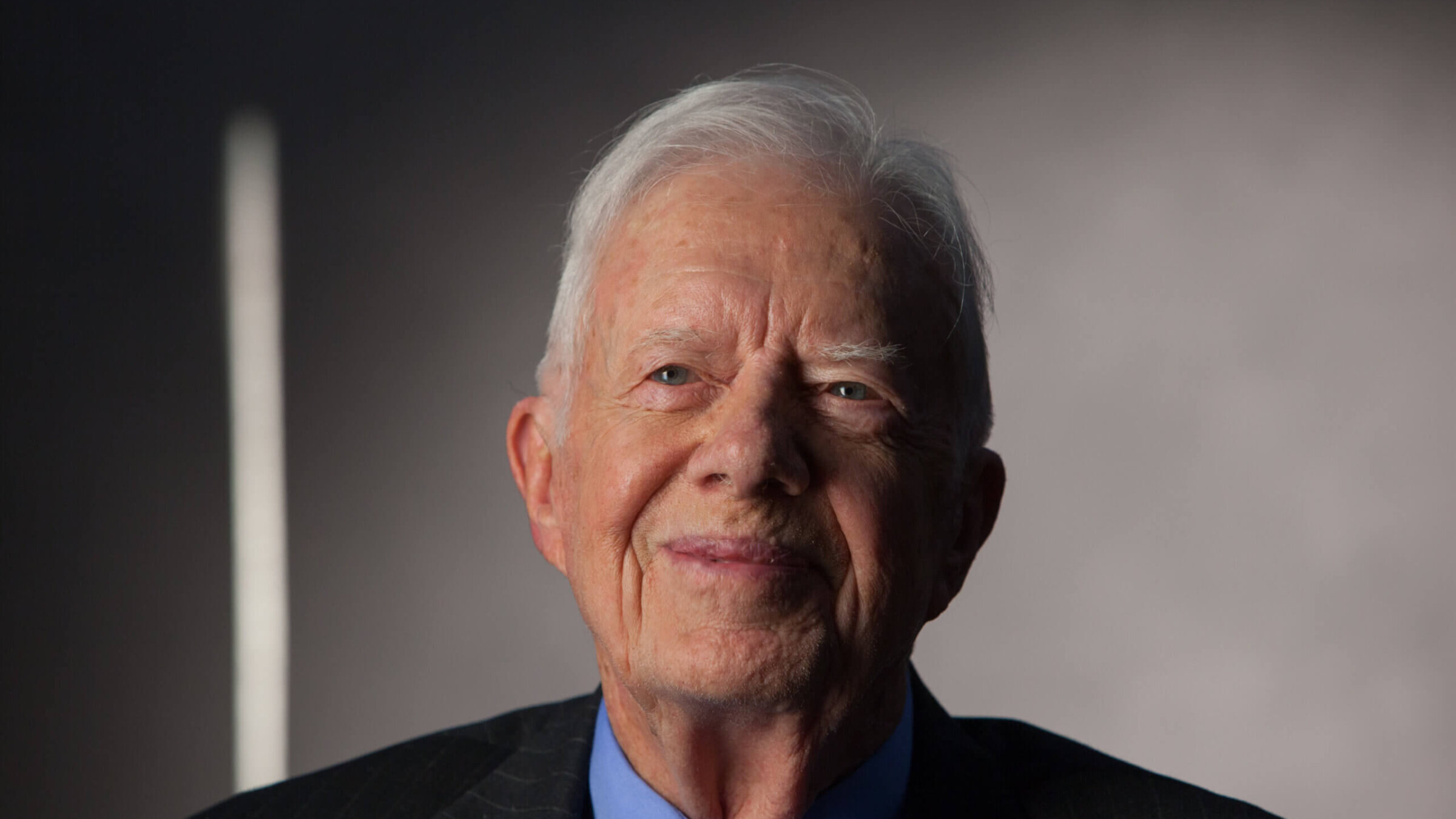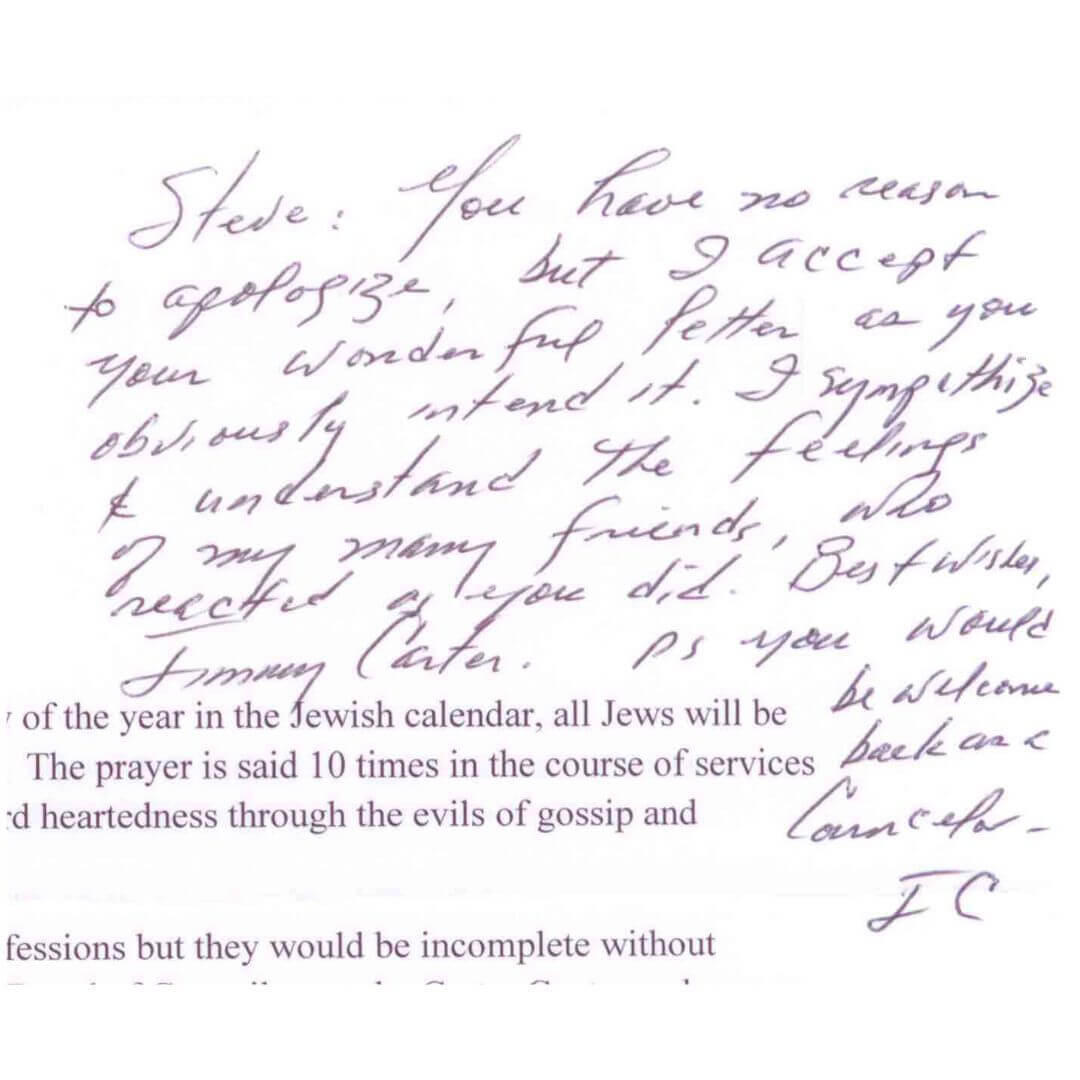I was wrong about Israel. I apologized. Then President Carter gave me a lesson in grace
Carter owed me nothing, yet gave me a sense there is a capacity within us all for unconditional love

Former President Jimmy Carter interviewed for “The Presidents’ Gatekeepers” project at the Carter Center, Atlanta, Georgia, Sept. 14, 2011. Photo by David Hume Kennerly/Getty Images
In the fall of 2015, with the leaves in Atlanta fading to a warm golden glow, I started doing my annual inventory of who I needed to apologize to. It was nearly Rosh Hashanah, and somehow, my attention drifted to President Carter.
Ten years prior, the Carter Center reached out to me to join their Board of Councilors. I was deeply moved by the work President Carter was doing for public health in Africa and nurturing nascent democracies.
Then in 2006, Carter published his now-famous book Palestine: Peace not Apartheid. I was troubled by the title, and by numerous passages that were very uncomfortable and disturbing to read. While I was increasingly frustrated by Israel’s occupation of the West Bank, I was angry that the president had roiled the diplomatic waters with his controversial book.
I led 15 members of the Board of Councilors to resign. I was not happy about this public break from the president, but I felt that even my left-of-center sensibilities had been betrayed. I listened to his explanations: He wasn’t calling Israel an apartheid state, he said, but warning that Israel was moving toward this state of affairs by its ongoing occupation of the West Bank. At the time, I wasn’t convinced.
But in the intervening years, I realized that he was likely right.
And so, I penned a letter to him. It spoke of the High Holidays, and my own personal admissions. I wrote about how the shofar was sounded as a means of awakening our spirits. I wrote that, as of late, I had started to view Israel’s occupation of the Palestinians as something that started in 1967 as an accident but was now becoming an enterprise with colonial intentions.
I sent my letter to Carter with no expectations. I was surprised when, a week later, I received a note from the president in reply.

I shared the exchange with my family and a few friends, and filed the letter away, where it sat for the past eight years. When the president’s family announced that the president had entered hospice care, I felt a sadness that accompanies such news.
Before it is too late, American Jews should apologize to Jimmy Carter, and thank him for everything he has done for us and the world.
Deep ties to Israel
My relationship with Israel started in 1965, when I was 10 years old. My parents took our family of three young boys to Haifa to spend the year while my father took a sabbatical leave. That year led to summers on a kibbutz, university year programs, and eventually two more years in the country with my wife.
All of our children created similar relationships with Israel. One daughter lived there for over 15 years and gave birth to three of our grandchildren there. My family is wound up very tightly in the Zionist dream of Jewish redemption.
I have seen rockets fall on my grandchildren’s city of Tel Aviv, and I was living in Jerusalem in 1973 when the Yom Kippur War took place. I have lost friends in terror attacks. In the last 57 years, I have experienced the entire range of emotions when the image of Israel is conjured: fear, anger, bereavement, frustration, sadness, exhilaration, connectedness and alienation.
I watched Israel closely after my resignation from the board of the Carter Center. During that period, I traveled to the country at least 20 times. I came to realize that the Jewish state was indeed burying its head in the sand. Israel was not facing the demographic realities, and was fast becoming a state that could not be both democratic and Jewish.
During this time, as the start-up nation revved its engines, the Israeli left seemed more consumed by espressos and stock options than with peace. The Israeli right would disingenuously speak about Abraham Accords and “peace deals” with nations thousands of miles away instead of any meaningful attempts to address the occupation taking place in its own backyard.
The reasonable Israelis would demur, “It’s complicated.” The right-wing Israelis would proclaim, “there is nobody to talk to.” And the left would say, “Waiter, another espresso please!”
In the meantime, I kept thinking about Carter’s prediction that apartheid was in Israel’s future if leadership kept ignoring the general direction of the country.
Our last chance for teshuvah
Peter Beinart wrote recently that “Jimmy Carter Deserves an Apology Before He Dies.” As I read it, I thought of the millions of lives the president affected through his successful battle to eradicate two diseases on the African continent, his tireless promotion of Habitat For Humanity and his campaign to support the growth of democracy.
Perhaps Carter’s most important achievement was the Camp David Peace Accord between Israel and Egypt. This peace treaty has endured for 44 years, and spared thousands of lives on the Israeli-Egyptian border. It also saved hundreds of billions of dollars in military costs that the two countries would have needlessly spent.
President Carter warned everyone in 2006 that we all had the choice of Peace Not Apartheid. Some have made deliberate choices on the matter of Israeli occupation; some have walked in a stupor, blaming the other for their shortcomings. Others still blame the messenger for the message.
In his response to my apology, Carter wrote a simple and touching message:
“You have no reason to apologize, but I accept your wonderful letter as you obviously intend it. I sympathize and understand the feelings of my many friends, who reacted as you did. Best wishes, Jimmy Carter.”
I was shaken and inspired by his humility. Carter owed me nothing, yet gave me a sense there is a capacity within us all for unconditional love.
To contact the author, email [email protected].

















